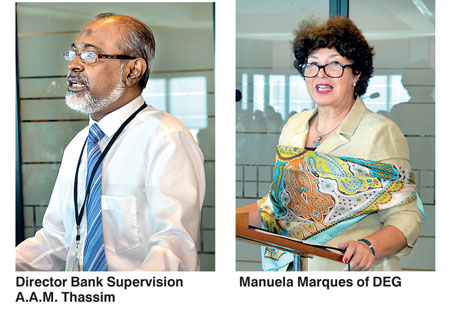Thursday Feb 19, 2026
Thursday Feb 19, 2026
Tuesday, 22 August 2017 00:30 - - {{hitsCtrl.values.hits}}
 The ‘Sri Lankan Sustainable Banking Initiative – Phase ll’ was kicked off in style at the Auditorium of the Hatton National Bank PLC on 15 August.
The ‘Sri Lankan Sustainable Banking Initiative – Phase ll’ was kicked off in style at the Auditorium of the Hatton National Bank PLC on 15 August.

Sri Lanka Banks’ Association (SLBA) partnered in 2015 for the ‘Sri Lankan Sustainable Banking Initiative’ with four European Development Financial Institutions (DFIs) led by DEG of Germany (Deutsche Investitions-und Entwicklungsgesellschaft mbH) while, FMO of the Netherlands (Nederlandse Finan-cierings-Maatschappij Voor Ontwikkelingslanden N.V.), OeEB of Austria (Oesterreichische Entwicklungsbank AG), and Proparco of France (Societe De Promotion Et Participation Pour La Cooperation Economique) were the other DFIs.
The ‘kick-off’ meeting was sponsored by Sri Lanka Banks’ Association together with Hatton National Bank, Pan Asia Bank and Rainbow Institute of Communication and English.
Gathering of decision makers
Event participants included SLBA representatives, senior members of DEG representing the partner DFIs, CEOs and senior management of the SLBA member banks, the Director of Bank Supervision representing the Central Bank of Sri Lanka, heads of NGOs concerned with developing sustainable financing principles, the Ministry of Sustainable Development and Wildlife, IUCN, and the IFC, as well as other stakeholders.
Sustainable Banking Initiative – a multi stakeholder engagement
“Transition to a green economy cannot be done by one bank or organisation alone. It must be a multi-stakeholder engagement and this is where the Sustainable Banking Initiative seeks to add value,” stated Renuka Fernando, Chairperson SLBA and CEO of Nations Trust Bank PLC in her opening remarks.
The event was thereafter addressed by Manuela Marques, Senior Director DEG; and then facilitated Melissa Makwarimba, Sustainable Finance Advisor of Innovativkonzept Ltd. and Khokhela Consult, the organisations that were selected to provide the technical support, spearheading the initiative. “Our experience shows that banks know their internal procedures best and therefore designing an Environmental and Social Risk Management approach in a pro-active manner is the most efficient,” Marques said.
Support extended by the Central Bank towards success of the initiative
The Director Bank Supervision, Central Bank of Sri Lanka A.A.M. Thassim stressed on the urgent need to take action in this regard. “The Central Bank of Sri Lanka would focus on sustainable banking practices to help banks to effectively manage environmental and social risks in the projects and promote sustainable banking,” Thassim explained.
Follow up to the success of Phase I
The event signified the start of Phase II, a follow up to Phase I of the Sri Lankan Sustainable Banking Initiative.
The initiative was signed by 18 banks in November 2015, ratifying 11 Sustainable Banking principles for Sri Lanka which were developed by a committee comprising members of these banks. The signatories were Amana Bank, Bank of Ceylon, Cargills Bank, Commercial Bank of Ceylon, DFCC Bank, Habib Bank, Hatton National Bank, MCB Bank, National Development Bank, Nations Trust Bank, Pan Asia Bank, People’s Bank, Regional Development Bank, Sampath Bank, Sanasa Development Bank, Seylan Bank, Sri Lanka Savings Bank and Union Bank.
Focus of Phase II
Phase II will commence in August 2017 and will last 18 months. The second phase of the SLBA-SBI Initiative will focus on providing all the necessary input and capacity building for implementing the 11 principles in terms of guidance documents, trainings, coachings, E-learning and case studies.
Good practices in the banking sector include responsible lending as well as minimising your environmental footprint, resource efficiency improvements, corporate social responsibility, and sustainability reporting.
Sri Lankan sustainable banking initiative aims
The aims of the initiative include creating a platform where banks can work together on sustainability issues. This platform will thereafter be used to facilitate decision-making and coordinate efforts in order to increase efficiency and effectiveness while ensuring of a level playing field.
Furthermore, the platform will also facilitate suggesting and jointly agreeing on minimal standards for integrating environmental and social considerations into core operations and to level the playing field through joint principles or standards.
Benefits to the participating banks
By being a signatory to the initiative, the banks will receive all the necessary inputs to implement the signed principles. They will also gain access to tailor-made E-Learning and E-coaching platform. Joint activities such as trainings, case studies and capacity building will also be accessible.
Other benefits include being in a position to shape the Central Bank’s approach and expectations, being involved in the latest discussion on relevant issues, improving overall risk management, better understanding of the business case of proper E&S management, and receiving the knowledge to market the information to clients and stakeholders.
The main benefit however will be the ability to contribute to sustainable development for a beautiful, clean and green Sri Lanka.